Do Russia and China pose a national security threat to the US in Greenland?
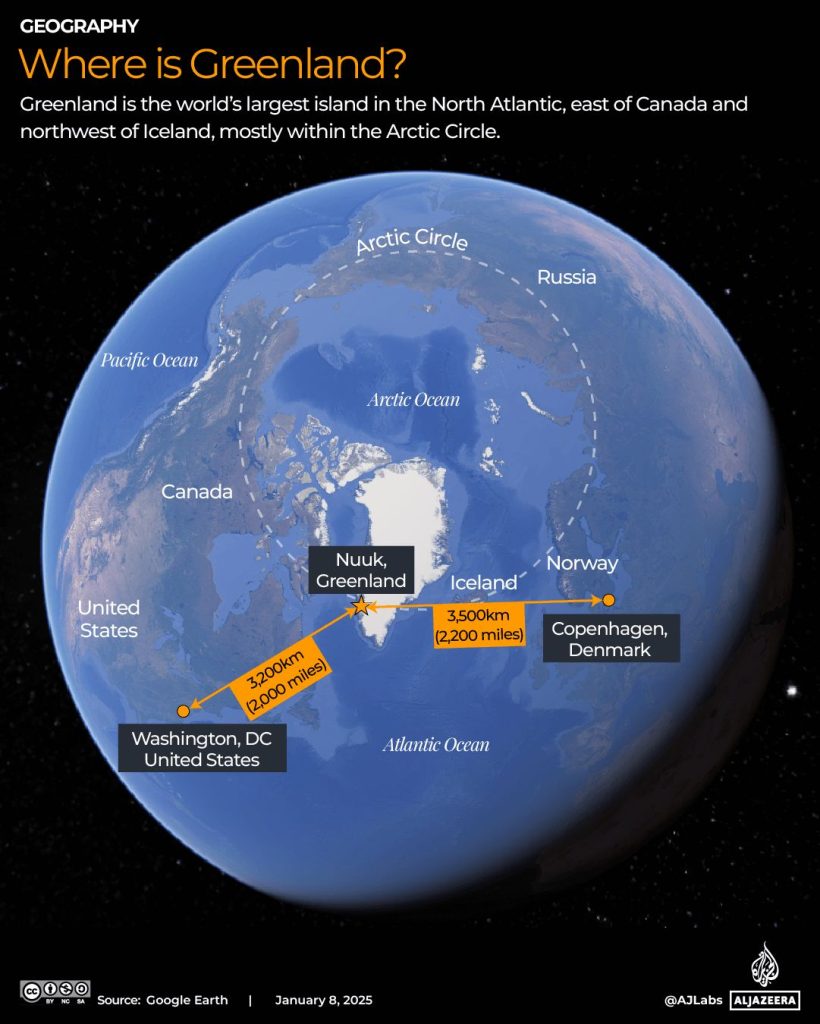
US President Donald Trump sees Greenland as a United States national security priority to deter Washington’s “adversaries in the Arctic region”, according to a White House statement released on Tuesday. The statement came days after Trump told reporters that the US needs Greenland from a national security perspective because it is “covered with Russian and Chinese ships”. Recommended Stories list of 4 itemsend of list Here’s what you need to know about what Trump said, whether Russia and China are present in Greenland, and whether they do pose a threat to American security. What has Trump recently said about Greenland? “Right now, Greenland is covered with Russian and Chinese ships all over the place. We need Greenland from the standpoint of national security,” Trump told reporters aboard Air Force One on January 4. The White House statement on Tuesday fleshed out further details on how the US would go about its acquisition of Greenland. “The president and his team are discussing a range of options to pursue this important foreign policy goal, and of course, utilizing the US military is always an option at the commander-in-chief’s disposal,” the White House statement says. Over the course of his second term, Trump has talked about wanting Greenland for national security reasons multiple times. “We need Greenland for international safety and security. We need it. We have to have it,” he said in March. Since 1979, Greenland has been a self-governing territory of Denmark, and since 2009, it has had the right to declare independence through a referendum. Advertisement Trump has repeatedly expressed a desire to take control of the island, which hosts a US military base. He first voiced this desire in 2019, during his first term as US president. As a response, leaders from Greenland and Denmark have repeatedly said that Greenland is not for sale. They have made it clear that they are especially not interested in becoming part of the US. On January 4, Denmark’s Prime Minister Mette Frederiksen said, “It makes absolutely no sense to talk about the US needing to take over Greenland.” “The US has no right to annex any of the three countries in the Danish kingdom,” she said, alluding to the Faroe Islands, which, like Greenland, are also a Danish territory. “I would therefore strongly urge the US to stop the threats against a historically close ally and against another country and another people who have very clearly said that they are not for sale,” Frederiksen said. US special forces abducted Venezuelan President Nicolas Maduro during an operation in the Venezuelan capital, Caracas, on January 3. Hours later, Katie Miller, the wife of close Trump aide and US Homeland Security Advisor Stephen Miller, posted a photo on X showing the US flag imposed on the map of Greenland. Greenland’s Prime Minister Jens-Frederik Nielsen hit back in an X post, writing, “Relations between nations and peoples are built on mutual respect and international law – not on symbolic gestures that disregard our status and our rights.” Why does Trump want Greenland so badly? The location and natural resources of the Arctic island make it strategically important for Washington. Greenland is geographically part of North America, located between the Arctic Ocean and the North Atlantic Ocean. It is home to some 56,000 residents, mostly Indigenous Inuit people. It is the world’s largest island. Greenland’s capital, Nuuk, is closer to New York City – some 2,900km (1,800 miles) away – than the Danish capital Copenhagen, which is located 3,500km (2,174 miles) to the east. Greenland, a NATO territory through Denmark, is an EU-associated overseas country and territory whose residents remain European Union citizens, having joined the European Community with Denmark in 1973 but having withdrawn in 1985. “It’s really tricky if the United States decides to use military power to take over Greenland. Denmark is a member of NATO; the United States is a member as well. It really calls into question what the purpose of the military alliance is, if that happens,” Melinda Haring, a senior fellow at the Atlantic Council Eurasia Center, told Al Jazeera. Advertisement Greenland offers the shortest route from North America to Europe. This gives the US a strategic upper hand for its military and its ballistic missile early-warning system. The US has expressed interest in expanding its military presence in Greenland by placing radars in the waters connecting Greenland, Iceland and the United Kingdom. These waters are a gateway for Russian and Chinese vessels, which Washington aims to track. The island is also incredibly rich in minerals, including rare earth minerals used in the high-tech industry and in the manufacture of batteries. According to a 2023 survey, 25 of 34 minerals deemed “critical raw materials” by the European Commission were found in Greenland. Greenland does not carry out the extraction of oil and gas, and its mining sector is opposed by its Indigenous population. The island’s economy is largely reliant on its fishing industry. Are Chinese and Russian ships swarming Greenland? However, while Trump has spoken of Russian and Chinese ships around Greenland, currently, facts don’t bear that out. Vessel tracking data from maritime data and intelligence websites such as MarineTraffic do not show the presence of Chinese or Russian ships near Greenland. Are Russia and China a threat to Greenland? The ships’ location aside, Trump’s rhetoric comes amid a heightened scramble for the Arctic. Amid global warming, the vast untapped resources of the Arctic are becoming more accessible. Countries like the US, Canada, China and Russia are now eyeing these resources. “Russia has never threatened anyone in the Arctic, but we will closely follow the developments and mount an appropriate response by increasing our military capability and modernising military infrastructure,” Russian President Vladimir Putin said during an address in March 2025 at the International Arctic Forum in the Russian city of Murmansk, the largest city within the Arctic Circle. During this address, Putin said that he believed Trump was serious about taking Greenland and that the US will continue with
Extreme flooding submerges Kosovo cities, villages
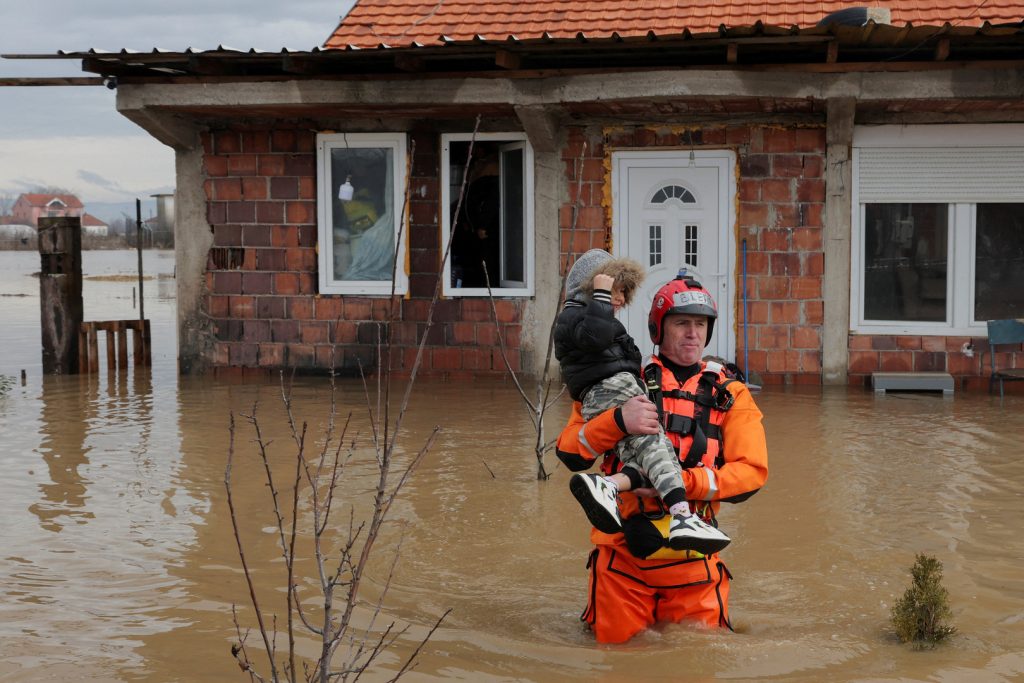
NewsFeed Emergency crews in Kosovo carried out a second day of evacuations after the region was devastated by floods. Footage shows people being evacuated from submerged homes as floodwaters slammed several municipalities. Published On 7 Jan 20267 Jan 2026 Click here to share on social media share2 Share Adblock test (Why?)
Saudi-led coalition strikes Yemen, says STC leader al-Zubaidi has fled
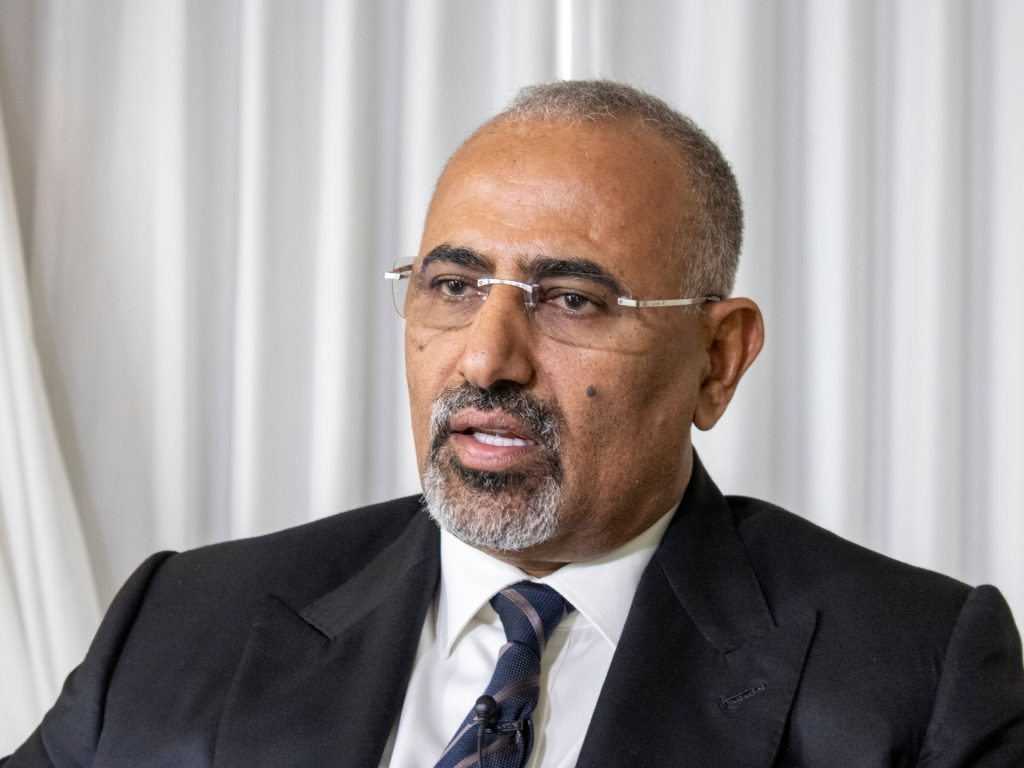
DEVELOPING STORYDEVELOPING STORY, Coalition says it targeted secessionist forces after Aidarous al-Zubaidi failed to board a plane scheduled to take him to Riyadh for talks. The Saudi Arabia-led coalition in Yemen has launched strikes on the country’s southern Dhale governorate, saying it was targeting secessionist forces after their leader fled without boarding a plane scheduled to take him to Riyadh. In a statement issued early on Wednesday, the coalition said the leader of the Southern Transitional Council (STC), Aidarous al-Zubaidi, had been due to fly out from the Yemeni city of Aden on Tuesday night for talks on ending the conflict between his group and the internationally recognised government of Yemen. Recommended Stories list of 4 itemsend of list But al-Zubaidi did not board the plane, and “fled to an unknown location,” it said. His whereabouts remain unknown. “During this time, the legitimate government and the coalition received information that al-Zubaidi had mobilised a large force, including armoured and combat vehicles, heavy and light weapons, as well as munitions,” it said. The force left Aden at around midnight and were later located in the Dhale governorate, it said. The coalition launched “preemptive strikes” at 4am local time (01:00 GMT) to disable those forces and thwart al-Zubaidi’s “attempt to escalate the conflict”, the statement added. There was no immediate comment from the STC. The council, which initially supported Yemen’s internationally recognised government against the Houthi rebels who control northern Yemen, launched an offensive against the Saudi-backed government troops in December, seeking an independent state in the south. The group is backed by the United Arab Emirates. Advertisement Their advance broke years of deadlock, with the STC seizing control of broad swaths of southern Yemen, including the Hadramout and Mahra provinces, in defiance of warnings from Riyadh. Hadramout borders Saudi Arabia, while Mahra is close to the border. Together, the provinces make up nearly half of Yemeni territory. Riyadh responded with air strikes on the Yemeni port of Mukalla on December 30, targeting what it called a UAE-linked weapons shipment, and backed a call by the internationally recognised government for UAE forces to withdraw from the country. Abu Dhabi denied that the shipment contained weapons and expressed a commitment to ensure Riyadh’s security. Shortly afterwards, it announced an end to what it called its “counterterrorism mission” in Yemen. Yemeni government troops, backed by Saudi Arabian air attacks, went on to reclaim Hadramout and Mahra, and the STC said on Saturday that it would attend peace talks hosted by Saudi Arabia. The Saudi-led coalition on Wednesday said the STC delegation, excluding al-Zubaidi, departed Yemen for Riyadh in the early hours of the morning. The head of the internationally recognised government’s Presidential Leadership Council, Rashad al-Alimi, also announced that al-Zubaidi has been removed from the council for “committing high treason”. Al-Alimi said he has asked the country’s Attorney General to launch an investigation against al-Zubaidi and take legal action. Adblock test (Why?)
Israeli forces kill two in Lebanon, ahead of truce monitors meeting
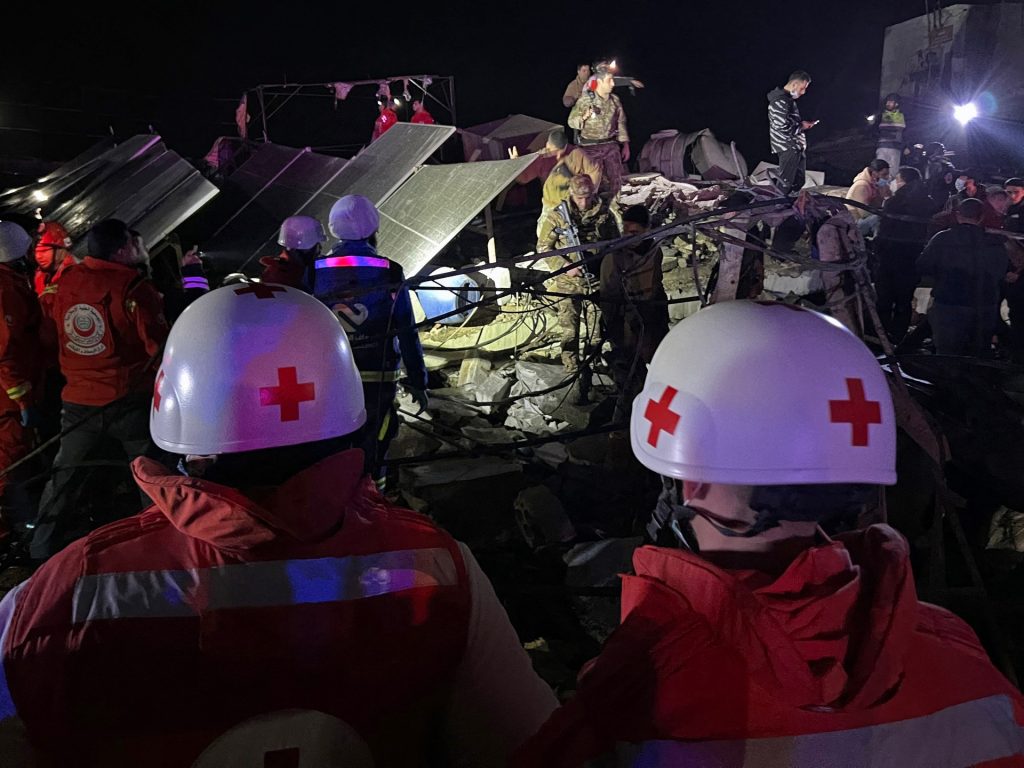
Representatives from France, Israel, Lebanon, the US and UN tracking the ceasefire are due to meet amid Israeli attacks. Israeli forces have killed two people in southern Lebanon a day before a committee monitoring a yearlong ceasefire between Israel and Hezbollah was due to hold its next meeting. Lebanon’s NNA news agency said two people were killed in the Israeli attack on a house in south Lebanon’s Kfar Dunin in Bint Jbeil on Tuesday. Recommended Stories list of 4 itemsend of list The Israeli military said in a statement that it struck two Hezbollah operatives in the area, accusing one of being “an engineering terrorist in a structure that facilitated the organisation’s reestablishment efforts”. The attacks come as the committee monitoring the ceasefire, which includes representatives from France, Israel, Lebanon, the United States, and the United Nations Interim Force in Lebanon (UNIFIL) prepared to meet on Wednesday. Israeli attacks have killed more than 300 people in Lebanon since the November 2024 ceasefire, including at least 127 civilians. Israeli forces bombarded several parts of Lebanon, killing at least two other people earlier this week, and ordered the forced evacuation of at least four villages in the south and east of the country. Another overnight attack reduced a multistorey building to rubble in an industrial area of Ghaziyeh town, near the coastal city of Sidon, according to a video verified by Al Jazeera and a photographer from the AFP news agency. In a statement earlier on Tuesday, Lebanese President Joseph Aoun said, “Israel’s continued attacks aim to thwart all efforts made locally, regionally and internationally to stop the ongoing Israeli escalation, despite the response shown by Lebanon to these efforts at various levels”. Advertisement Beirut-based security affairs analyst Ali Rizk told Al Jazeera the recent attacks come as no surprise following last week’s meeting between US President Donald Trump and Israeli Prime Minister Benjamin Netanyahu at Trump’s Mar-a-Lago resort in Florida. “There had been reports that Israel got a green light to escalate against Hezbollah,” Rizk told Al Jazeera. ‘Difficult and dangerous conditions’ The spokesperson for the UN secretary-general, Stephane Dujarric, told a media briefing in New York on Tuesday that Israeli attacks are continuing in close proximity to UNIFIL peacekeepers stationed along the Blue Line, which demarcates the de facto border between Israel, Lebanon, and the occupied Golan Heights. “We are aware that Israeli strikes carried out late Monday night following evacuation orders on targets, reportedly linked to Hezbollah and Hamas,” Dujarric said. “The strikes occurred in areas north of the Litani River, including in western Bekaa, in Lebanese territory in southern Lebanon.” Dujarric added that the UNIFIL peacekeepers detected “three air strikes in their areas of operations” on Monday as well as “several fighter aircraft activities above UNIFIL.” “In addition, our peacekeepers reported multiple instances of direct fire originating from [Israeli army] positions south of the Blue Line, including small arms fire impacting the Kfar Shouba area, a Merkava tank fire near Shab’a, and a small arms fire impacting near a UN position near Kfar Shouba,” Dujarric said. UN Undersecretary-General for Peace Operations Jean-Pierre Lacroix, who is visiting Lebanon currently, said on X that he met with UNIFIL peacekeepers who are “carrying out their mandated tasks under increasingly difficult and dangerous conditions”. Lacroix is set to meet Lebanese officials on Wednesday. Later this week, Lebanon’s cabinet will convene to discuss the army’s progress in disarming Hezbollah, a plan launched under heavy US pressure and amid fears of expanded Israeli strikes. The army was expected to complete the disarmament south of the Litani River, about 30km (20 miles) from the border with Israel, by the end of 2025, before tackling the rest of the country. In his statement, Aoun said the government’s plan to “extend its authority over the south of the Litani” has been “implemented by the Lebanese army with professionalism, commitment and precision”. Adblock test (Why?)
How strong are Latin America’s military forces, as they face US threats?
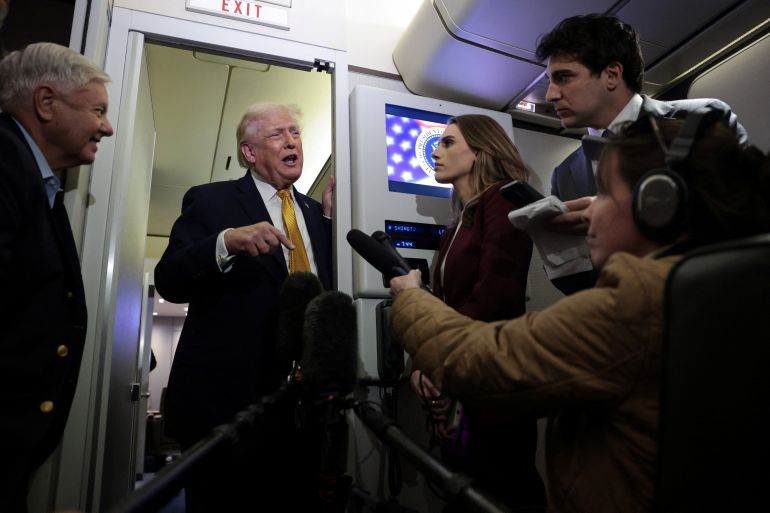
Over the weekend, the United States carried out a large-scale military strike against Venezuela and abducted President Nicolas Maduro in a major escalation that sent shockwaves across Latin America. On Monday morning, US President Donald Trump doubled down, threatening action against the governments of Colombia, Cuba and Mexico unless they “get their act together”, claiming he is countering drug trafficking and securing US interests in the Western Hemisphere. The remarks revive deep tensions over US interference in Latin America. Many of the governments targeted by Trump have little appetite for Washington’s involvement, but their armed forces lack the capacity to keep the US at arm’s length. US President Donald Trump issues warnings to Colombia, Cuba and Mexico while speaking to reporters on Air Force One while returning from his Florida estate to Washington, DC, on January 4, 2026 [Jonathan Ernst/Reuters] Latin America’s military capabilities The US has the strongest military in the world and spends more on its military than the total budgets of the next 10 largest military spenders combined. In 2025, the US defence budget was $895bn, roughly 3.1 percent of its gross domestic product. According to the 2025 Global Firepower rankings, Brazil has the most powerful military in Latin America and is ranked 11th globally. Mexico ranks 32nd globally, Colombia 46th, Venezuela 50th and Cuba 67th. All of these countries are significantly below the US military in all metrics, including the number of active personnel, military aircraft, combat tanks, naval assets and their military budgets. Advertisement In a standard war involving tanks, planes and naval power, the US maintains overwhelming superiority. The only notable metric that these countries have over the US is their paramilitary forces, which operate alongside the regular armed forces, often using asymmetrical warfare and unconventional tactics against conventional military strategies. (Al Jazeera) Paramilitaries across Latin America Several Latin American countries have long histories of paramilitary and irregular armed groups that have often played a role in the internal security of these countries. These groups are typically armed, organised and politically influential but operate outside the regular military chain of command. Cuba has the world’s third largest paramilitary force, made up of more than 1.14 million members, as reported by Global Firepower. These groups include state-controlled militias and neighbourhood defence committees. The largest of these, the Territorial Troops Militia, serves as a civilian reserve aimed at assisting the regular army against external threats or during internal crises. In Venezuela, members of pro-government armed civilian groups known as “colectivos” have been accused of enforcing political control and intimidating opponents. Although not formally part of the armed forces, they are widely seen as operating with state tolerance or support, particularly during periods of unrest under Maduro. In Colombia, right-wing paramilitary groups emerged in the 1980s to fight left-wing rebels. Although officially demobilised in the mid-2000s, many later re-emerged as criminal or neo-paramilitary organisations, remaining active in rural areas. The earliest groups were organised with the involvement of the Colombian military following guidance from US counterinsurgency advisers during the Cold War. In Mexico, heavily armed drug cartels function as de facto paramilitary forces. Groups such as the Zetas, originally formed by former soldiers, possess military-grade weapons and exercise territorial control, often outgunning local police and challenging the state’s authority. The Mexican military has increasingly been deployed in law enforcement roles in response. History of US interference in Latin America Over the past two centuries, the US has repeatedly interfered in Latin America. In the late 19th and early 20th centuries, the so-called Banana Wars saw US forces deployed across Central America to protect corporate interests. In 1934, President Franklin D Roosevelt introduced the “Good Neighbor Policy”, pledging nonintervention. Advertisement Yet during the Cold War, the US financed operations to overthrow elected governments, often coordinated by the CIA, founded in 1947. Panama is the only Latin American country the US has formally invaded, which occurred in 1989 under President George HW Bush. “Operation Just Cause” ostensibly was aimed at removing President Manuel Noriega, who was later convicted of drug trafficking and other offences. Adblock test (Why?)
I won the Oxford Union presidency. Then my identity was put on trial
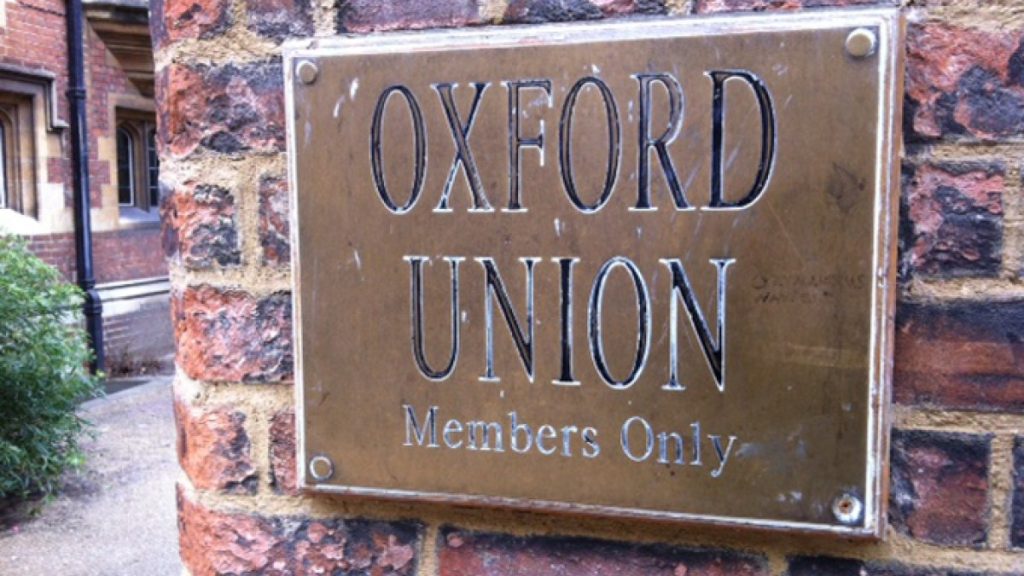
In December 2025, I was elected president of the Oxford Union, the world-famous debating society. I made history as the first Palestinian to hold the role in the institution’s 203-year history. I won the presidency by a significant margin, in an election that saw turnout far exceed recent contests. Throughout my campaign, I was open about my background as a Palestinian from Gaza, and about how my identity and family history have shaped my understanding of the importance of representation and debate. That openness, however, quickly became the basis for sustained attempts to discredit me. Rather than engaging with my stated platform or my record, early press reporting questioned my suitability for office purely on the basis of who I am. The aim was clear: to portray me as a radical, an extremist, someone inherently suspect. These reports did not emerge in isolation. They formed part of a wider smear campaign that accompanied my presidential run, in which I was cast as an extremist and a security concern. Within that framing, false rumours began circulating that students who supported my campaign could face consequences themselves, including the loss of visas, placement on security watchlists or formal investigations. No evidence was ever produced to substantiate any of this. I always expected student politics to involve a certain level of hostility. What shocked me was the extent to which supposedly reputable outlets adopted these narratives without basic due diligence, and in some cases went further, presenting insinuations as fact in order to depict me as unfit for office. Advertisement That pattern became unmistakable when I received an email from the Jewish Chronicle seeking my response to a forthcoming article, a month after I had already been reported on by the Jerusalem Post. The email was framed as an opportunity for a “right of reply”, but in practice it set out a series of claims and insinuations, presented as evidence of extremism. The most glaring of these was a supposed family link to a Hamas member. The claim referred to Mohammed Al-Rayis, a man killed in an Israeli drone strike in Beirut in January 2024. He is not related to me. The suggestion relied on pairing one of the most common first names in the Arab world with a widely shared family name from Gaza. My father, Mohammed Elrayess, who bears the same name, is a scientist at Qatar University and is very much alive. Other points raised in the same email were not allegations of wrongdoing at all, but descriptions of my speech and activities, reframed to appear suspicious. One concerned a social media post in which I mourned the killing of Saleh Aljafarawi, a Palestinian journalist killed in Gaza in October 2025, shortly after the announcement of the latest “ceasefire”. In the email, the Jewish Chronicle journalist described Aljafarawi as a “Hamas propagandist”. Israel’s assault on Gaza has been the deadliest conflict for journalists in recorded history. My post was a defence of press freedom and a tribute to a media worker killed in the line of duty. Another concerned my involvement in a documentary I helped produce, Heart of a Protest, which followed pro-Palestine demonstrations across the UK. It was a zero-budget film that allowed protesters to explain why they continued to mobilise and the obstacles they faced in doing so. All proceeds went to families in Gaza. Another line of attack focused on a speech I made at the Oxford Union in November 2024, in favour of the motion, “This house believes that Israel is an apartheid state responsible for genocide”. There was no interest in the substance of what I said. The objection was to my participation itself. I am proud that I spoke at that debate to rebut arguments that justified or supported the genocide in Gaza. I am proud that I was able to speak about my relative, Maisara Al-Rayis, who was killed alongside his family in an Israeli air strike on his home. If that is an allegation, I accept it without hesitation. For me, these patterns of attack do not reflect strength. They reflect weakness. If the concerns raised about me were genuine, if I truly posed a danger to the institution I now lead, there would be no need to recast lawful and legitimate political expression as evidence of extremism, or to imply guilt through invented family associations. Advertisement These attempts to discredit me sit within a broader effort to silence Palestinians in public life, and to discourage Palestinian participation altogether. They are meant to warn us off. They will not. Let a hundred articles be written to mischaracterise or defame us. We have long passed the point where this can intimidate us into silence. If anything, it makes the need to speak all the more urgent. The views expressed in this article are the author’s own and do not necessarily reflect Al Jazeera’s editorial stance. Adblock test (Why?)
Real Madrid’s Mbappe out of Spanish Super Cup derby with Atletico

Real Madrid forward Kylian Mbappe has been ruled out of the Saudi Arabia-hosted Spanish Super Cup due to a knee injury. Published On 6 Jan 20266 Jan 2026 Click here to share on social media share2 Share Real Madrid’s French international striker Kylian Mbappe will miss the Spanish Super Cup this week as he recovers from a knee sprain. The Spanish giants did not name the French superstar, the team’s top goalscorer, in their squad on Tuesday for the tournament in Jeddah, Saudi Arabia. Recommended Stories list of 4 itemsend of list Mbappe was diagnosed with the issue last week, with the expectation that the 27-year-old would likely be sidelined for at least three weeks. Xabi Alonso’s side face city rivals Atletico Madrid on Thursday in the semifinals, with Barcelona taking on Athletic Bilbao on Wednesday. The Spanish coach is under pressure after a disappointing start to the season, with his team trailing champions Barca by four points in La Liga. Alonso had told journalists last week that would “do everything we can to get him back as soon as possible”. Adding, “We’re going to be pushing the deadlines; it’s very much a matter of feelings. When is as soon as possible? That’s the question. I don’t know. The Super Cup? We hope.” Mbappe equalled Cristiano Ronaldo’s club record of 59 goals in a calendar year for Real in their 2-0 La Liga win over Sevilla on December 20. The former Paris Saint-Germain striker’s form is in stark contrast with his strike partner, Vinicius Junior, who scored 22 goals last season, but has struck just five times across all competitions this term and has not found the net since October. Adblock test (Why?)
Children dying from water-borne disease at Sudan displacement camp
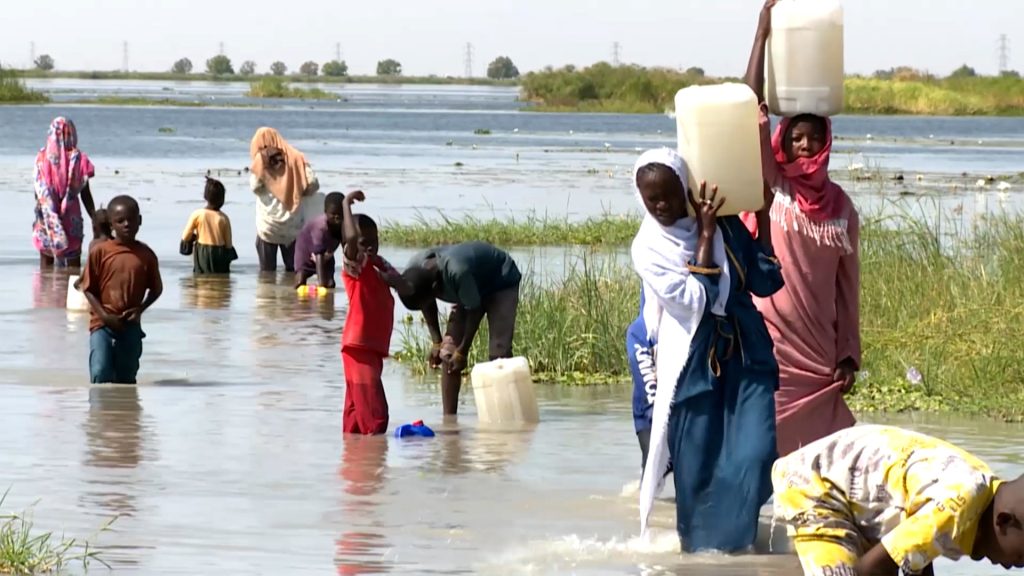
NewsFeed Families forced to flee their homes because of Sudan’s war have been cut off from health care services and are living in camps with no clean water. Now their children and some of the elderly are dying from bilharzia, a disease caused by a parasitic worm that lives in infested water. Al Jazeera’s Mohammad Vall filed this report from the Khor Ajwal camp in White Nile State. Published On 6 Jan 20266 Jan 2026 Click here to share on social media share2 Share Adblock test (Why?)
Jailed Palestine Action activist ends 60-day hunger strike as health fails

Prisoners For Palestine says activist Teuta Hoxha needs to be hospitalised but has been denied medical treatment by prison authorities. Published On 5 Jan 20265 Jan 2026 Click here to share on social media share2 Share Palestine Action activist Teuta Hoxha has paused her hunger strike in the United Kingdom after more than two months without food while demanding immediate bail and the right to a fair trial. The group Prisoners For Palestine wrote on Instagram on Monday that Hoxha is in serious condition and needs to be hospitalised. It alleged the 29-year old has been denied proper treatment by prison authorities. Recommended Stories list of 4 itemsend of list Hoxha “needs urgent medical care in hospital to prevent refeeding syndrome. The prison is refusing [her] medical treatment, which is required to prevent death in extreme cases of starvation”. Refeeding syndrome, a potentially fatal condition, happens when nutrition is restarted in a starving person too quickly. There was no immediate comment from prison or government officials. For the past 63 days, Palestine Action members have been on hunger strikes in prisons around the UK after being jailed over alleged involvement in break-ins at the UK subsidiary of Elbit Systems in Filton near Bristol in 2024. Elbit Systems is an Israeli defence company with factories and offices across Britain. Some members of Palestine Action are also being held for an alleged break-in at a Royal Air Force base in Oxfordshire, where two military aircraft were sprayed with red paint. The prisoners deny the charges against them, which include burglary and violent disorder. After Hoxha has paused her protest, only three of eight Palestine Action hunger strikers continue to refuse food as they demand their release. ‘Apartheid regime’ In July, the British government voted in favour of proscribing Palestine Action as a “terrorist” organisation – putting it into the same category as armed groups such as al-Qaeda and ISIL (ISIS). Advertisement More than 1,600 people have been arrested in connection with support for Palestine Action after near-weekly protests for the ban to be revoked. The proscription is being challenged in court. The protest group, launched in 2020, has described itself as a movement “committed to ending global participation in Israel’s genocidal and apartheid regime”. Those still on hunger strike include Heba Muraisi, 31, and Kamran Ahmed, 28. Lewie Chiaramello, 22, is also refusing food every other day because he’s diabetic. The strikers have made five demands: immediate bail, the right to a fair trial, an end to censorship of their communications, “de-proscribing” Palestine Action and closing Elbit Systems factories in the UK. People protest at a pro-Palestine demonstration in Manchester, England [File: Gary Roberts/SOPA Images/LightRocket via Getty Images] Adblock test (Why?)
Colombia’s Petro promises to defend homeland amid Trump threats

President criticizes Trump, calling US threats an undue interference in Colombian internal matters under international law. Published On 5 Jan 20265 Jan 2026 Click here to share on social media share2 Share Colombian President Gustavo Petro says he would “take up arms” for his country if necessary as the United States issues threats against him and his government. In a social media post on Monday, Petro, a former leftist fighter, said any violent US intervention in Colombia, such as the kind carried out in Venezuela over the weekend, would provoke a response. Recommended Stories list of 3 itemsend of list “I swore not to touch a weapon again,” Petro said. “But for the homeland I will take up arms again.” Petro has emerged as an outspoken critic of US President Donald Trump, who has threatened Colombia with possible military strikes in the name of combating drug trafficking. The two leaders have frequently traded insults, but Trump’s threats have become increasingly hostile in recent days. The US president said over the weekend that Petro should “watch his a**” after the abduction of Venezuelan leader Nicolas Maduro, an act widely considered illegal by scholars of international law. Speaking with reporters on Sunday, Trump said a similar operation against Petro’s government “sounds good to me”. “Colombia is very sick, too, run by a sick man, who likes making cocaine and selling it to the United States, and he’s not going to be doing it very long,” Trump said. Colombia’s Ministry of Foreign Affairs denounced Trump’s comments as “an undue interference in the internal affairs of the country, against the norms of international law”. Trump has accused Petro of facilitating the trafficking of drugs to the US, a claim for which there is no evidence and is firmly denied by Petro, who says his government has worked to combat drug production while taking steps away from the militarised approach of the war on drugs. Advertisement “I have enormous trust in my people,” Petro said. “And that is why I have asked the people to defend the president from any illegitimate violent act against him.” Adblock test (Why?)

